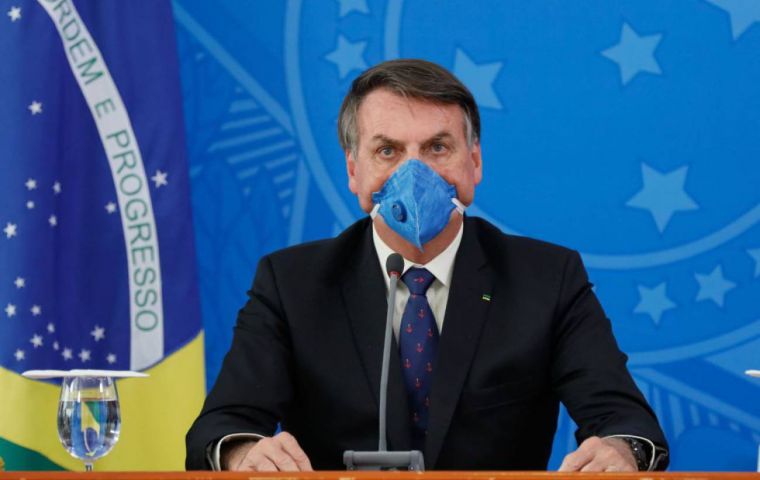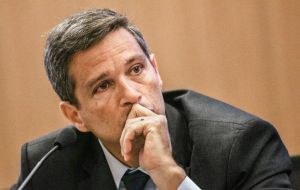MercoPress. South Atlantic News Agency
Brazil's central bank preparing a “financial bazooka” to prevent recession becoming depression
 With President Bolsonaro’s government keen to reduce a substantial deficit, it may fall to the central bank to fire the financial “bazooka”
With President Bolsonaro’s government keen to reduce a substantial deficit, it may fall to the central bank to fire the financial “bazooka”  Brazil’s central bank President Roberto Campos Neto said his preference was to provide the banking system with liquidity
Brazil’s central bank President Roberto Campos Neto said his preference was to provide the banking system with liquidity Brazil’s central bank could soon be forced to fire up the money printing presses if the coronavirus-fueled recession facing Latin America’s largest economy is as devastating as some economists fear.
Hopes for any growth this year have all but evaporated. Many observers expect Brazil’s US$ 1.8 trillion economy to post its first annual contraction since 2016. Some are predicting the biggest crash in decades, with a slide of up to 6%.
With President Jair Bolsonaro’s government keen to reduce a substantial deficit, it may fall to the central bank to fire the financial “bazooka” required to prevent recession from turning into depression, economists say.
That could mean taking a leaf out of major central banks’ post-2008 crisis playbook and embracing “quantitative easing,” or QE: buying government bonds with newly-created money to lower long-term interest rates and flooding the financial system with cash.
Brazil’s central bank President Roberto Campos Neto sidestepped the question on Thursday, saying his preference was to provide the banking system with liquidity. With interest rates at 3.75%, there is room for more conventional action, but many economists see QE as increasingly likely.
“It will end up happening,” said Jose Francisco Goncalves, chief economist at Banco Fator in Sao Paulo. “We’re going to do it. There’s no other way.”
“Campos Neto is extremely competent: he has a world view, and is aware of the consequences of the central bank’s actions. This could be his Mario Draghi moment,” Goncalves said.
At the height of the euro zone crisis in July 2012, Mario Draghi, then president of the European Central Bank, uttered his now famous remark that the ECB would do “whatever it takes” to save the euro. It was the turning point of the crisis.
Leaders of the G20 group of rich nations on Thursday echoed Draghi with a pledge to inject US$ 5 trillion in fiscal spending into the global economy and “do whatever it takes to overcome the pandemic.”
The ECB, U.S. Federal Reserve, Bank of England, and Bank of Japan have already pumped trillions into their financial systems, often leaning on deft legal and political guidance to overcome domestic opposition.
This week, the central banks of Australia and New Zealand took their first forays into the world of QE and Israel’s central bank resumed bond-buying for the first time since 2009.
“It’s happening all around the world. It’s not just the big central banks like the Fed,” said Carlos Kawall, director at Asa bank in Sao Paulo and a former treasury secretary.
“I don’t see why we wouldn’t be doing that. It’s time to look for unconventional policies,” he said.
Like many central banks, Brazil’s is prevented by law from buying bonds at government debt auctions - so-called monetary financing - but is allowed to buy them on the secondary market to support money supply or monetary policy management.
Inflation is undershooting the central bank’s target and inflation expectations continue to decline, despite a 20% depreciation in the exchange rate this year.
A significant tightening of Brazilian financial conditions from plunging stock prices, a record low exchange rate and widening credit spreads has rung alarm bells for market stability and future growth prospects.
To be sure, the central bank has already shown itself to be flexible, under former trader Campos Neto’s guidance.
It has ramped up foreign exchange intervention, opened a bond “repurchase” program, and taken a range of steps to inject liquidity into the financial system to free up banks’ funds for lending and ease companies’ and individuals’ debt burdens.
In the bank’s own words, it has pledged to “deploy its arsenal of monetary, exchange rate and financial stability policies to fight the current crisis.”




Top Comments
Disclaimer & comment rulesCommenting for this story is now closed.
If you have a Facebook account, become a fan and comment on our Facebook Page!